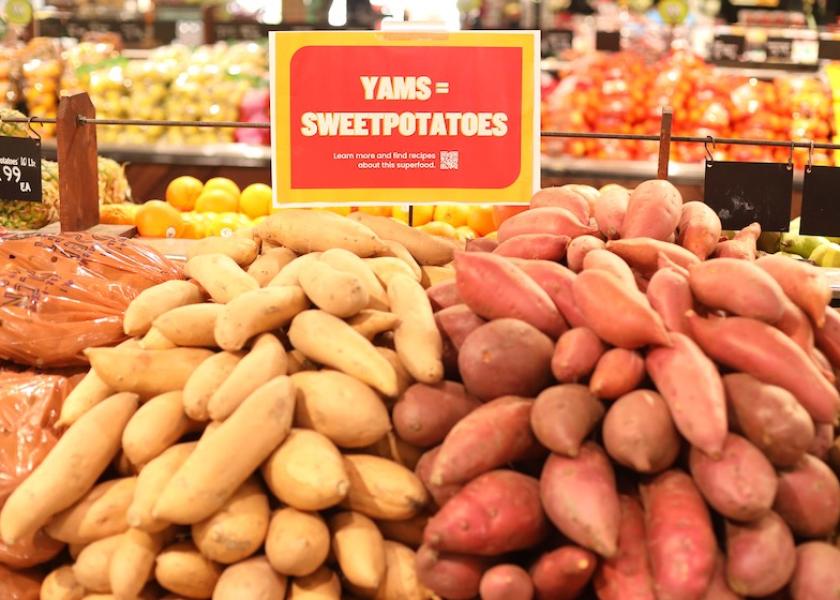Yam equals sweetpotato, new campaign tells consumers

Consumers are on notice that yams equal sweetpotatoes.
California sweetpotato farmers are on a mission to end consumer confusion, entice younger buyers and increase retail sales of this superfood, according to a news release.
“It’s very likely that many shoppers who come into the store looking for sweetpotatoes are walking away confused and empty-handed when what they see on the shelf is labeled a yam,” Sarah Alvernaz, a California sweetpotato grower and member of the California Sweetpotato Council, said in the release. “Or perhaps it’s the reverse — they’re looking for yams, but the sign says sweetpotato.”
To clear things up, the California Sweetpotato Council is launching a campaign for California retailers that aims to educate consumers and drive sales of sweetpotatoes, the release said.
The message to consumers is simple: "Yam = Sweetpotato," the release said.
“Sweetpotatoes come in all kinds of colors — red, orange, white and even purple. You may see them labeled as yams in the grocery store, but they’re actually sweetpotatoes,” Alvernaz said. “True yams are very different from sweetpotatoes and are a starchy, tuberous vegetable mostly grown in Africa. These are not grown and are largely not available in the U.S., despite what you might see on display signs.”
Alvernaz and the California Sweetpotato Council hope to end this confusion, particularly for younger consumers who may not be interested in eating yams but have heard that sweet potatoes are a superfood.
“We want people to know that sweetpotato is simply a modern, more accurate term than yam," Alvernaz said.
To support the message, the California Sweetpotato Council plans to work with retailers on new signage labeling sweetpotatoes in their stores that will enhance sales, the release said. The council is offering incentives from October through January to select California retailers who conduct promotions designed to educate shoppers about sweetpotatoes, the release said. Eligible promotions include in-store signage, demos, sales contests, ad features, social media or other shopper marketing tools that educate consumers.
Funding for this campaign is partially coming from a California Specialty Crop Block Grant awarded to the California Sweetpotato Council for the next two years. Managing the campaign is Sacramento-based public relations and marketing firm Farmers Communications Exchange, the release said.
“Working with the California Sweetpotato Council, we’ve prepared a host of marketing materials to educate consumers and convince retailers to help end sweetpotato-yam confusion,” Marilyn Freeman, of Farmers Communications Exchange, said in the release. “Our firm is partnering with merchandising specialist Carolyn Becker who will be meeting with California retailers in the coming months to set up in-store tests and coordinate promotions with the California sweetpotato industry.”
The campaign will be supported with social media and web-based information for consumers along with tools to educate produce department personnel, according to the release.
Freeman explains that signage for sweetpotatoes commonly found in grocery stores does not reflect today’s sweetpotato crop. As with most commodities, sweetpotato growers produce many different varieties. Older sweetpotato variety names like jewell or garnet are still commonly used on store signage, but these varieties are no longer produced in California, the release said.
“We are encouraging retailers to label sweetpotatoes according to color,” Alvernaz said. “Most varieties grown in California can be accurately labeled as either red, orange, white or purple sweetpotatoes, rather than using specific variety names. And most definitely none of these varieties are yams.”
Retailers and consumers can find simplified, updated information about yam varieties on the California Sweetpotato Council website.
“We want people to understand the Thanksgiving yam dish that’s been in their family for generations has always been made with sweetpotatoes and that sweetpotatoes can be used in a variety of recipes not just for the holidays,” Freeman said. “Ultimately, we hope to demonstrate that with proper signage and knowledge, consumers will buy more sweetpotatoes!”
For more information about the campaign, visit casweetpotatoes.com or email info@casweetpotatoes.com.







